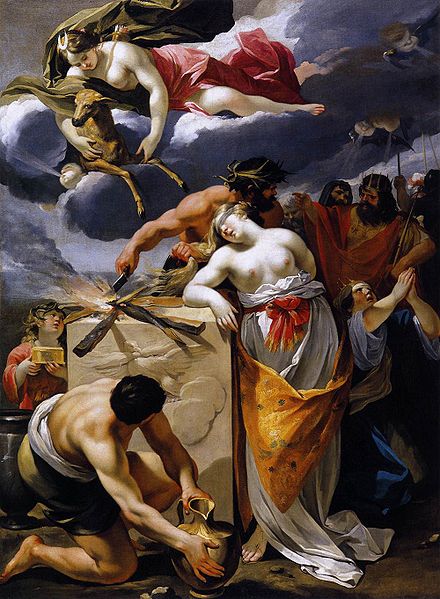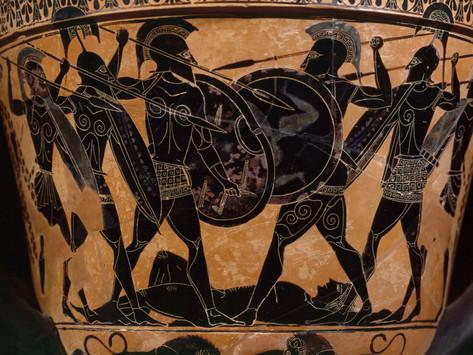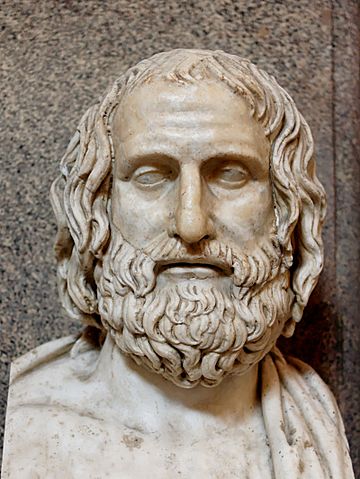
Iphigenia in Aulis
Iphigenia in Aulis by Euripides
First produced soon after the great tragedian’s death in 405 BC in a winning tetralogy that included The Bacchae and Alcmaeon in Corinth, Iphigenia in Aulis is, perhaps, the most corrupted of all surviving plays by Euripides, so much so that it is difficult to say whether the play was even half-finished before he died. It is set at the Greek camp in Aulis, where contingents from all over Greece have gathered to sail for Troy. Unfortunately, there are no winds whatsoever, and they can’t leave the port. Agamemnon has learned from his prophets that the only way for him to get the winds to blow and take his ships to Troy is through sacrifice, and the person he needs to sacrifice is none other than his daughter Iphigenia. With this in mind, he has already written to his wife Clytemnestra to bring Iphigenia from Argos to Aulis using a supposed marriage to the great Greek hero Achilles as an excuse. However, just a little before the beginning of the play, it seems that he has realized his mistake and attempts to send another letter to Argos via a faithful servant of his, in which he advises wife to ignore the first message. Agamemnon’s servant is, however, intercepted by Menelaus, who, adamant to retrieve Helen from the Trojan, starts a furious argument with his brother after realizing that Agamemnon has second thoughts about going through with Iphigenia’s sacrifice. Barely has the quarrel between the two finished when a messenger arrives to announce the imminent arrival of Iphigenia and Clytemnestra. Agamemnon’s sorrowful response at the news touches Menelaus and he backs down. This doesn’t solve Agamemnon’s problems, as he realizes that even if he doesn’t order the sacrifice of Iphigenia, his army would eventually commit the deed of its own accord, possibly even worse. In the meantime, Clytemnestra and Iphigenia arrive and encounter Achilles; during a brief discussion, they immediately realize that the Greek hero doesn’t know anything about the supposed marriage. Agamemnon’s servant reveals to the women that it was all a ploy to get Iphigenia to Aulis, and, upon hearing this, Clytemnestra begs Achilles to do something and save her daughter. However, even though he tries, he proves powerless as his speech is met with booing by the army that starts threatening him as well. Suddenly, Iphigenia changes her mind and expresses her willingness to die for the glory of her country. Her last request is simple but never met: that her mother doesn’t hate her father for her death.
Date and Historical Background
First produced soon after Euripides death—most probably in 405 BC—Iphigenia in Aulis was part of a tetralogy that included The Bacchae and Alcmaeon in Corinth; directed by his nephew, Euripides the Younger, Euripides’ plays came in first at that year’s City Dionysia. There is a great chance that the play was left unfinished at Euripides’ death; if it had been completed, then it has been severely edited ever since, and numerous interpolations and excisions (dating all the way to the play’s original production) have left the play in a pretty dire condition. In fact, as one Euripides’ scholar notes (Cecelia A. E. Luschnig) the text of Iphigenia in Aulis is so corrupted that “every reader must also be a playwright, called upon to put together from a multiplicity of possibilities a drama that is coherent and makes sense as a piece of theater.”
Characters and Setting
Characters
• Agamemnon, supreme commander of the Greek forces under Troy, husband of Clytemnestra, and father of Iphigenia, Orestes and Electra, brother of Menelaus
• Menelaus, king of Sparta and husband of Helen; brother of Agamemnon
• Clytemnestra, daughter of Tyndareus, sister of Helen, wife of Agamemnon
• An Old Man, a loyal Servant of Agamemnon and Clytemnestra
• Iphigenia, virgin-daughter of Clytemnestra and Agamemnon
• Achilles, the greatest Greek warrior under Troy, demigod: son of Thetis, a nymph, and Peleus, king of Phthia
• First Messenger, attendant of Clytemnestra
• Second Messenger
• Chorus of young married women from Chalcis, a city in Euboea across from Aulis
Setting
The setting is the Greek camp at Aulis where the Greek fleet has gathered to sail for Troy—but is stuck.
Summary of Iphigenia in Aulis
Prologue
The play opens with a prologue which starts with a dubitable, suspiciously non-Euripidean discussion between Agamemnon and a loyal Servant of his, in which the commander of the Greeks under Troy expresses second thoughts over the content of a previously sent letter to his wife Clytemnestra. In a long monologue in the middle of the discussion, Agamemnon reveals the events that have led to the opening discussion, going all the way back to his marriage with Clytemnestra and the oath sworn by all of the numerous suitors for her sister’s hand (Helen) to defend the honor of her freely chosen husband (Menelaus). Of course, the oath came into effect soon after, when Helen deserted Menelaus for the Trojan prince Paris, an event which has provoked the Greek gathering at Aulis. However, due to the lack of favorable winds, the fleet has remained stuck at the port for quite some time, and just recently Agamemnon has learned from the great prophet Calchas the reason for this: the guardian-goddess of Aulis, Artemis, asks for a blood sacrifice, more precisely that of Agamemnon’s own teenage daughter, Iphigenia.
“When I heard this,” explains further Agamemnon, “I commanded Talthybius with loud proclamation to disband the whole army, as I could never bear to slay my daughter. Whereupon my brother, bringing every argument to bear, persuaded me at last to face the crime; so I wrote in a folded scroll and sent to my wife, bidding her dispatch our daughter to me on the pretense of wedding Achilles, at the same time magnifying his exalted rank and saying that he refused to sail with the Achaeans, unless a bride of our lineage should go to Phthia.” However, Agamemnon has grown to regret his decision and has now called upon his Servant to send another letter to his wife revoking the orders from the first one. Upon hearing out Agamemnon, The Old Man agrees that nothing could be worse than Iphigenia’s sacrifice and rushes off to deliver the letter as soon as possible. Agamemnon himself leaves the stage, retiring to his tent.
Parodos (Entrance Song)
As soon as Agamemnon and the Old Man leave, a Chorus of young married women from Chalcis steps out on the stage and bursts into a song celebrating the Greek troops. One by one, they describe its various leaders, and remember their genealogies and previous heroic deeds.
First Episode
Menelaus suddenly bursts onto the scene, rushing in the direction of Agamemnon’s tent with his brother’s letter in his hands. The Old Man tries to recover it, but is unable to do so. Agamemnon hears their quarrel and comes out of his tent. Menelaus is furious: “Look me in the face,” he says to his brother, and tell me that you did not send “this tablet, the bearer of a shameful message?” Agamemnon scolds Menelaus for having broken the seal and blames him for shamelessness. However, Menelaus doesn’t back down, and threatens to show the content of the letter to the entire army. “I am anxious to test you,” he says, “and do not seek from rage to turn aside from the truth, nor will I on my part overstrain the case.” It is evident that Menelaus has other things against his brother as well, accusing him of falseness and disloyalty to his friends: before he became a commander, he had been humble, cordial and caring to everybody, but now he is suddenly “hard of access, seldom to be found at home.” And now this—he has put his own interests and family before that of the army and the state. “Countless others have done the same,” Menelaus concludes. “They make an effort while in power, and then retire dishonorably, sometimes owing to the senselessness of the citizens, sometimes deservedly, because they are too feeble of themselves to maintain their watch upon the state. For my part, I am more sorry for our unhappy Hellas, whose purpose was to read these worthless foreigners a lesson, while now she will let them escape and mock her, thanks to you and your daughter. May I never appoint a man to rule my country or lead its warriors because of his courage! Sense is what the general must have; since any man, with ordinary intelligence, can govern a state.”
Agamemnon begs to differ: in his eyes, he is the sensible one, and Menelaus the one acting foolishly. Agamemnon claims that his brother insists on this war with Troy merely because his honor has been hurt by the elopement of Helen. He also adds that none of the other Greek leaders really wants a war, and that they have come because of the oath sworn before Helen’s father, Tyndareus. In other words, he concludes, if they are relieved of their oath-bound duties, they will gladly go back to their houses. In Agamemnon’s opinion, this is precisely what should be done, since the Greek warriors swore allegiance to Menelaus only while still hopeful of getting Helen’s hand in marriage and not thinking rationally. Thankfully, Agamemnon concludes, the gods are smart and “able to discern where oaths have been wrongly pledged or forcibly extorted.”
The quarrel of the two brothers is interrupted by a Messenger who enters hurriedly to announce the arrival of Iphigenia and Clytemnestra. “Ah, woe is me!” shrieks painfully Agamemnon realizing that there’s no turning back now. “Unhappy wretch, what can I say? Where shall I begin? To what cruel straits have I been plunged!” Upon noticing the depth of his brother’s sorrow, Menelaus changes his mind and withdraws from his former proposals. “Do not slay your child or prefer my interests to yours,” he says caringly, “for it is not just that you should grieve, while I am glad, or that your children should die, while mine still see the light of day… Let the army be disbanded and leave Aulis.”
Strangely enough, Agamemnon thanks Menelaus but doesn’t accept his proposal: he too has reverted from his previous position and is now all but sure that Iphigenia must be sacrificed! Upon being asked by Menelaus to clarify the reasons for this abrupt change, Agamemnon explains that if he doesn’t kill his daughter, the Greek army inevitably will, since Calchas will, sooner or later, reveal his oracles to the soldiers. It might even be worse in that case, because Calchas will surely bid the Argives to slay him and Menelaus as well. And even if they escape to Argos, the Greek armies will come and destroy his palace, “razing it to the ground, Cyclopean walls and all.” Even though there is obviously no easy way out for Agamemnon out of these painful perplexities, there is certainly one which seems less bloody.
With this in mind, Agamemnon beseeches Menelaus to make sure that Clytemnestra doesn’t learn anything of his ploy until after the sacrifice, and then leaves to welcome his wife and his daughter. Left alone, the Chorus starts extolling praises on moderate love, contrasting it with the passionate one between Paris and Helen that is destined to be paid with thousands of lives.
Second Episode
Agamemnon returns with Clytemnestra, Iphigenia and the baby Orestes. It is a touching irony-filled reunion, which starts with Iphigenia throwing herself into the arms of her father. “You did well in bringing me here to you,” she says. “I know not how I am to say yes or no to that, my child,” he replies. After a few back-and-forth’s, Iphigenia implores Agamemnon to hurry home from Troy after triumphing, to which her father replies that he must offer a sacrifice to the gods first. Iphigenia agrees, and is both surprised and joyful to learn that she will witness it firsthand. As tears well to her father’s eyes, she goes inside Agamemnon’s tent to prepare herself for the occasion. Just like any concerned mother, Clytemnestra asks Agamemnon numerous questions concerning the genealogy and the qualities of their daughter’s future husband. Agamemnon tries to end it abruptly by imploring Clytemnestra to go back to Argos with Orestes, but she will not have it: “a mother should give her own child away,” she says. “Go, manage matters out of doors; but in the house it is my place to decide.”
Disappointed to have failed to take Clytemnestra out of the picture—and mad at himself for forming plots and subtle schemes against his best-beloved—Agamemnon follows Clytemnestra inside the tent, while the Chorus, in the second stasimon, sings of the coming of war to Troy and all the tears it will cause.
Third Episode
Achilles interrupts the Chorus’ song with a complaint about the delay: unable to restrain his Myrmidon army, he has come to the tent of Agamemnon to search for some answers. Instead, he happens upon his wife Clytemnestra who introduces herself as such and asks Achilles’ hand as “a prelude to a happy marriage.” Achilles is baffled and immediately declines this, mistaking the offer as an attempt by Clytemnestra to woo him. Unfortunately, his confusion doesn’t disappear even after Agamemnon’s wife makes her intentions clearer: “What wedding do you speak of? Words fail me, lady; can your wits have gone astray and are you inventing this?”
Soon after, Clytemnestra and Achilles realize that someone “made a mock” of them both. Embarrassed, Clytemnestra bids “farewell” to Achilles, who tries to enter the tent and find Agamemnon, but before he can go inside, the Old Man (Agamemnon’s servant) comes out and reveals to the queen and the hero the nature of Agamemnon’s plot. Realizing that he’s not lying, Clytemnestra restlessly throws herself before the feet of Achilles and starts begging him to help her and Iphigenia. Feeling betrayed at least just as much as duty-bound, Achilles agrees: “Never shall your daughter,” he says to Clytemnestra, “after being once called my bride, die by her father's hand; for I will not lend myself to your husband's subtle tricks; no! for it will be my name that kills your child, although it does not wield the sword.”
Possibly in admiration of Achilles’ decision to put the needs of a human in pain before those of the army, in the third stasimon, the Chorus sings of the famous wedding of his parents, Thetis and Peleus.
Exodos (Exit Song)
After catching sight of him before his tent, Clytemnestra confronts Agamemnon with the truth: “I know all,” she says. “I have heard what you are bent on doing to me.” Dissatisfied with his failure to keep Iphigenia’s sacrifice a secret from other people, Agamemnon remains speechless while Clytemnestra elucidates on the absurdity of his vicious plans to slay his own daughter, an innocent virgin, while Hermione, the daughter of Helen—she whose fault is everything—remains sheltered in Sparta where she is prophesized to live happily ever after with her parents. Iphigenia overhears the discussion and comes out of the tent to offer, if nothing else, her tears in exchange for her life. “What have I to do with the marriage of Paris and Helen?” she asks tearfully. “Why is his coming to prove my ruin, father? Look upon me; bestow one glance, one kiss, that this at least I may carry to my death as a memorial of you, though you do not heed my pleading.” Agamemnon defends his painful decision as a necessary one and as the only one that might keep Greece at bay from barbarian invasion: if Iphigenia is not sacrificed, he explains, then the Trojans will win the war and they will kill the wives and daughters of all Greek man.
In the meantime, Achilles returns with some distressing news: every single Greek soldier in Aulis deems Iphigenia’s sacrifice necessary, including his own Myrmidon warriors. Even so, Achilles is adamant that he will protect Iphigenia’s life even at the cost of his own. Iphigenia thanks him, but says that there is no need for such a heroic act: after hearing out her father’s arguments, she has changed her mind and is now resolved to die for the future glory of her country. “If Artemis has decided to take my body,” she asks rhetorically, “am I, a mortal, to thwart the goddess? no, that is impossible. I give my body to Hellas; sacrifice it and make an utter end of Troy. This is my enduring monument; marriage, motherhood, and fame—all these is it to me.” As Iphigenia parts with her mother and is led off to her death, Achilles bemoans her fate and the fact that it has deprived him of the possibility to marry such a heroic spirit.
(In a final epilogue, rejected by almost all editors of Euripides, a Messenger arrives to announce that Iphigenia has not died, but has been saved in the final moment by the goddess Artemis who has taken her somewhere and placed a deer at the altar. “What joy to hear these tidings from the messenger!” says the Chorus, with Clytemnestra agreeing, but still unsure if they are, indeed, true.)
A Brief Analysis
In his Poetics, Aristotle uses the character of Iphigenia in this play as a paradigmatic example of inconsistency, writing that “Iphigenia the suppliant in no way resembles her later self.” And, indeed, it is difficult to accept her sudden change of heart, framed within two highly melodramatic, but too manifestly conflicting speeches: the former tearfully asking for compassion, the latter bravely advocating for patriotism. Curiously, this is not the only example of such transformation in the play: one can even argue that Agamemnon’s and Menelaus’ are even more striking and less expected. It is almost customary for a tragic agon—that is to say, a formal discussion, a sort of “battle of wits”—to end either with one clear winner or with the two sides unmoved from their starting points. However, the discussion between Agamemnon and Menelaus ends like no other in extant Greek tragedies: they change each other’s minds (which, of course, just reformulates the problem). But, then again, it is difficult to say how much of this has been intended or even written by Euripides: the text of Iphigenia in Aulis is obviously corrupted more than any other of the surviving Greek plays, and scholars are more than certain that whole scenes (such as large parts of the prologue and the entire epilogue) have been added much later, not to mention separate lines and speeches. Even so, as reconstructed, the play is not without its virtues, most markedly Euripides’ subtle criticism of the role of the archetypal hero, probably directly influenced by the seemingly endless Peloponnesian War, which, with interruptions, had been led for the entire quarter of a century before the death of Euripides. Ironically, it will end just a year after that, leaving behind a completely devastated Athens which will never regain its pre-war prosperity and artistic ingenuity.
Iphigenia in Aulis Sources
There are many translations of Iphigenia in Aulis available online, both in verse and in prose; if you are a fan of the latter, you can read E. P. Coleridge’s translation for Loeb Classical Library here. If, however, you prefer poetry, feel free to delve into Arthur S. Way blank verse adaptation here.
See Also: Iphigenia, Trojan War, Iphigenia in Tauris, Euripides
Iphigenia in Aulis Video
Iphigenia in Aulis Associations
Link/Cite Iphigenia in Aulis Page
Written by: The Editors of GreekMythology.com. GreekMythology.com editors write, review and revise subject areas in which they have extensive knowledge based on their working experience or advanced studies.
For MLA style citation use: GreekMythology.com, The Editors of Website. "Iphigenia in Aulis". GreekMythology.com Website, 30 Jan. 2020, https://www.greekmythology.com/Plays/Euripides/Iphigenia_in_Aulis/iphigenia_in_aulis.html. Accessed 25 April 2024.




